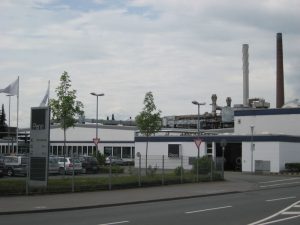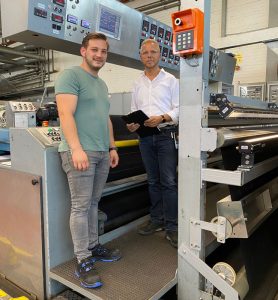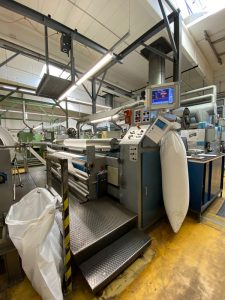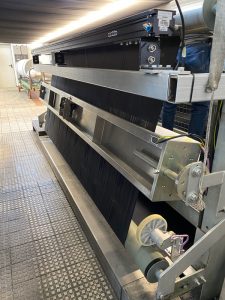
Penn Textile Solutions Relies On Process Control From Mahlo
TW Special Report
When you think of a textile production hotspot, Paderborn, Germany, may not be the first place that comes to mind. It should though! Because this is where Penn Textile Solutions GmbH has been based since 1959. The company is one of the world’s leading manufacturers of elastic fabrics for under-wear, corsetry, sportswear and swimwear, as well as highly functional textiles for technical applications. The fully integrated company with its own warping, circular knitting, warp knitting, dyeing and finishing facilities currently employs around 150 people.
“Over the past several years, one of the areas Penn has specialized in is the production of custom-fit, close-contour compression knits. These are increasingly being used in the sporting goods sector,” noted Operations Manager Franz Schütte. “Customers can expect a unique design with highly functional wearing comfort from our articles at the same time.” The production of these textiles requires the corresponding know-how as well as the appropriate production and process technology for the production of the surfaces as well as for the finishing and quality assurance. In order to continue to meet these high demands, Penn wanted to further optimize its tenter frame processes.

Many of the products are made from so-called compression knits, in which different constructions are integrated within one quality. Penn produces the compression knitted fabrics on special raschel looms. “The compression zones place accurately in the finished element. The balance of the agents plays an important role here.” In the subsequent finishing process, a textile surface with the required stretch behavior, the appropriate repeat lengths and basis weights should be created, particularly in the drying and fixing process. The measuring and control system in the tenter frame process must realize and guarantee these requirements over the entire length of the section. Not an easy task!
Penn Has Long Relied On Mahlo
To achieve its own high quality targets day after day, Penn has relied on the cooperation with Germany-based Mahlo GmbH + Co. KG, based in Bavaria, for years. The manufacturer of measuring, control and automation systems for web-shaped goods has decades of experience in the field of process control. “We have been using Mahlo systems for more than 30 years and have always been able to rely on excellent results,” says Schütte. Until the summer of 2020, the textile manufacturer had been using a basis weight measurement system in the tenter frame outlet with beta radiation and manual control. “When the krypton preparations had passed their half-life, we had to make a decision: Exchange or replace the system right away.”

They sat down with Mahlo representatives and looked for the best solution. Since the systems had already reached a high operating age and the measurement was limited to the basis weight, a new concept was decided upon. “Mahlo made us the best price-performance offer.” The new system should be even more efficient and easier to operate for the special makes.
The compression zones of the functional fabric create corresponding distortions within the textile surface in its raw state, which have to be smoothed out in the fixing process. This work is now taken over by a process control system. The Mahlo Famacont PMC-15 with two measuring points automatically controls the leading of the stenter frame by continuously and contactlessly determining the mesh density. In addition, the Patcontrol PCS-20 process control system ensures that the dimensions of the different zones are recorded and also automatically controlled. “The previous beta-radiation facility was not able to collect this kind of data,” explained the Penn operations manager. Another important aspect for the textile manufacturer: the complete and costly radiation protection is no longer necessary with the new systems.

Despite very good experience with Mahlo in the past, every change naturally involves a risk. Penn did not have to rely on theoretical considerations, however, but carried out tests in advance with appropriate sample material in the Mahlo test laboratory. The results convinced the decision-makers. “In addition, appropriate internal considerations and external consultations provided us with the necessary certainty for the investment decision. The risk was therefore manageable,” Schütte said. The investment has already paid off. “The new measurement and control technology enables consistent compliance with our desired parameters.” Scrap in the form of manufacturing waste due to mismatched quality parameters has decreased by 5 percent. Due to the success of the production process, a further measuring station for thread density and basis weight was put into operation this summer.
January 27, 2022




